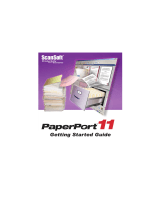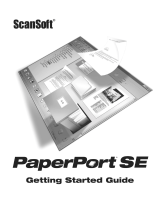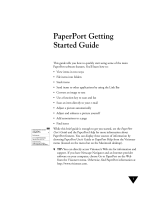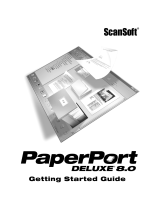Page is loading ...


Working with PaperPort and
PaperPort Deluxe
FOR WINDOWS
®
®

COPYRIGHT INFORMATION
PaperPort Software for Windows. Copyright ©1999-2000 ScanSoft, Inc. All rights reserved.
Reproduction, adaptation, or translation without prior written permission is prohibited, except as allowed under the copyright laws.
FormTyper, MicroChrome, PaperEnable, PaperPort, PaperPort Deluxe, PaperPort Links, PaperPortation, SimpleSearch, SharpPage, Visioneer Pro OCR 100,
TextBridge, and the PaperPort logo are registered trademarks of ScanSoft, Inc.
Microsoft is a U.S. registered trademark of Microsoft Corporation. Windows is a trademark of Microsoft Corporation. ZyINDEX is a registered trademark of
ZyLAB International, Inc. ZyINDEX toolkit portions, Copyright © 1990-2000, ZyLAB International, Inc. All Rights Reserved. All other products
mentioned herein may be trademarks of their respective companies.
Information is subject to change without notice and does not represent a commitment on the part of ScanSoft, Inc. The software described is furnished under
a licensing agreement. The software may be used or copied only in accordance with the terms of such an agreement. It is against the law to copy the software
on any medium except as specifically allowed in the licensing agreement. No part of this document may be reproduced or transmitted in any form or by any
means, electronic or mechanical, including photocopying, recording, or information storage and retrieval systems, or translated to another language, for any
purpose other than the licensee’s personal use and as specifically allowed in the licensing agreement, without the express written permission of ScanSoft, Inc.
Restricted Rights Legend
Use, duplication, or disclosure is subject to restrictions as set forth in contract subdivision (c)(1)(ii) of the Rights in Technical Data and Computer Software
Clause 52.227-FAR14. Material scanned by this product may be protected by governmental laws and other regulations, such as copyright laws. The customer
is solely responsible for complying with all such laws and regulations
©
ScanSoft, Inc.
9 Centennial Drive
Peabody, Massachusetts 01960
U.S.A.
Working With PaperPort and PaperPort Deluxe
Part number 00–09729–00
.

iii
Table of Contents
P
REFACE
. . . . . . . . . . . . . . . . . . . . . . . . . . . . . . . . . . . . . . . . . . . . . . 5
Related Information . . . . . . . . . . . . . . . . . . . . . . . . . . . . . . . . . . . . . . 5
Technical Support . . . . . . . . . . . . . . . . . . . . . . . . . . . . . . . . . . . . . . . 6
W
ORKING
WITH
P
APER
P
ORT
AND
P
APER
P
ORT
D
ELUXE
. . . . . . . . 7
Viewing items in Desktop View . . . . . . . . . . . . . . . . . . . . . . . . . . . . . 7
Viewing an item in Page View . . . . . . . . . . . . . . . . . . . . . . . . . . . . . 8
Viewing items by using the application that created them . . . . . . . . 10
Creating stacks . . . . . . . . . . . . . . . . . . . . . . . . . . . . . . . . . . . . . . . . . 10
Moving between stacked pages . . . . . . . . . . . . . . . . . . . . . . . . . . . . . 12
Faxing or e-mailing an item . . . . . . . . . . . . . . . . . . . . . . . . . . . . . . . 12
Converting a PaperPort item to text . . . . . . . . . . . . . . . . . . . . . . . . . 15
Filing items in folders . . . . . . . . . . . . . . . . . . . . . . . . . . . . . . . . . . . 16
Adding Folders to the Folder View (PaperPort Deluxe only) . . . 17
Filing items in folders by using Desktop View . . . . . . . . . . . . . . 19
Creating a new folder . . . . . . . . . . . . . . . . . . . . . . . . . . . . . . . . . 20
Using Windows Explorer to manage items . . . . . . . . . . . . . . . . 20
Capturing Web pages (PaperPort Deluxe only) . . . . . . . . . . . . . . . . 22
Annotating a page . . . . . . . . . . . . . . . . . . . . . . . . . . . . . . . . . . . . . . 24
Adjusting pictures . . . . . . . . . . . . . . . . . . . . . . . . . . . . . . . . . . . . . . 25
Improving pictures automatically . . . . . . . . . . . . . . . . . . . . . . . . 25
Adjusting a picture yourself . . . . . . . . . . . . . . . . . . . . . . . . . . . 26
Finding Items . . . . . . . . . . . . . . . . . . . . . . . . . . . . . . . . . . . . . . . . . 29
Scanning to a link application with ScanDirect
(PaperPort Deluxe only) . . . . . . . . . . . . . . . . . . . . . . . . . . . . . . . . 30
Filling in preprinted forms with FormTyper
(PaperPort Deluxe only) . . . . . . . . . . . . . . . . . . . . . . . . . . . . . . . . 31

5
Preface
This guide shows you how to use PaperPort and PaperPort Deluxe
software from ScanSoft, Inc. Please read this preface for information
about the following items:
•
related information
•
technical support
Please note that this manual is designed for readers who are already
familiar with the operation of their computers, peripheral equipment
(scanners, digital cameras, printers), and the Windows operating
system.
R
ELATED
I
NFORMATION
While this guide is enough to get you started, take advantage of the
variety of other information that is available:
Web.
Visit ScanSoft’s Web site at www.scansoft.com where you can find
Technical Notes, Frequently Asked Questions (FAQs), software updates,
and more. For a quick way to access information on the Web site,
choose a category from the Internet menu.
CD.
Access the CD, your source for installing additional software that
works with the PaperPort software and for viewing the online
documentation.
Help.
Get help fast. Everything you want to know about PaperPort—
how to procedures, dialog box reference, and troubleshooting advice.
Scanner or other peripheral device documentation.
Consult the
documentation that came with your scanner, multi-function printer,
digital camera, or other image-capture device.

6
P
REFACE
T
ECHNICAL
S
UPPORT
If you should experience problems with PaperPort that you cannot
resolve on your own using the documentation and software, go to:
www.scansoft.com
The ScanSoft Web site provides a link to PaperPort pages, including
Technical Support with Frequently Asked Questions, technical
information bulletins, and a problem report form.
Before sending a problem report form to ScanSoft Technical Support,
be sure to visit FastTrack, ScanSoft’s electronic support system on the
web site. Using an Intelligent Expert Reasoning™ methodology,
FastTrack delivers intuitive self-service via the Internet and allows you
to successfully resolve your problems online 24 hours a day, seven days a
week. Software downloads, product upgrades and product updates are
also available in FastTrack.
If you still cannot resolve your problem, contact ScanSoft Technical
Support. Make a note of the following information to help in solving
the problem:
•
Your software version number. (This is in the Help menu under
About PaperPort.)
•
Your scanner (or other image-capture device) make and model
•
A description of the steps that led up to the problem
•
If PaperPort generated an error message, an exact description of the
error message or its number and when it appeared.

7
Working with PaperPort
and PaperPort Deluxe
This guide shows you how to use some of the PaperPort and PaperPort
Deluxe software features to view items, create stacks, send items
electronically to PaperPort Links, add annotations, file items in folders,
capture Web pages (PaperPort Deluxe only), and edit color images. The
examples in this guide usually represent the PaperPort Deluxe software.
However, in most cases, these examples are similar to what you see if
you are using the basic PaperPort software.
V
IEWING
ITEMS
IN
D
ESKTOP
V
IEW
PaperPort provides several ways to view items:
Desktop View
displays a
thumbnail
, a small graphic that represents each item in a folder.
You can see PaperPort items (max files) and non-PaperPort items
(items created using other applications, such as Microsoft Word).
With PaperPort Deluxe, the thumbnails of both PaperPort and non-
PaperPort items show actual images of the items. Non-PaperPort items
also include an icon which indicates the application used to create the
item. With basic PaperPort, a non-PaperPort item is represented by a
small rectangular thumbnail and not an actual image.
To view items in Desktop View:
•
Double-click the PaperPort
icon on the Windows desktop. This
opens PaperPort, and displays its Desktop View:

8
W
ORKING
WITH
P
APER
P
ORT
AND
P
APER
P
ORT
D
ELUXE
V
IEWING
AN
ITEM
IN
P
AGE
V
IEW
The Desktop View and Page View are separate applications that you can
run individually or at the same time. Page View displays a close-up view
of one page so that it is readable on the screen.
In Page View, you can view PaperPort items. You can also view non-
PaperPort items (items created using other applications) with PaperPort
Deluxe. You can adjust and edit the quality, color, and other aspects of a
PaperPort image by using the Image Editing toolbar. With the
annotation tools, you can add comments, highlight or circle
information, or add a picture to a PaperPort item.
The Command Bar has
shortcuts for choosing
menu commands, such
as changing views.
Use the Folder View to
navigate between differ-
ent folders and to file and
organize items.
Thumbnail of a
PaperPort item
The Link Bar has icons that represent other applications
and functions that work with PaperPort. The icons vary,
depending on the applications installed on your computer.
Stacks are PaperPort
items that have been
combined. Stack titles
appear in bold type
above the page titles.
The status bar shows
information about the
selected item, link, or
button.
Use the scroll arrow to
view other links on the
Link Bar.
Thumbnail of a non-PaperPort item, in this
case a Word file (in PaperPort Deluxe).

V
IEWING
AN
ITEM
IN
P
AGE
V
IEW
9
To view a PaperPort item in Page View:
•
In Desktop View, double-click a PaperPort item or select a PaperPort
item, and then click the
Page
button on the Command Bar. You can
also double-click a PaperPort item in Windows Explorer to view it in
Page View.
To view a non-PaperPort item in Page View
(PaperPort Deluxe only):
•
In Desktop View, Shift-double-click a non-PaperPort item, or select a
non-PaperPort item, and then click the
Page
button on the
Command Bar.
Note:
You can set a preference in Page View that lets you open
multiple Page View windows at the same time. For more information
about preferences, see the online Help.
The Command Bar has
shortcuts for menu
commands.
The Annotation toolbar
has tools for adding
notes, highlighting ar-
eas, cutting and pasting
a selection, adding a pic-
ture, and so on.
The status bar shows
information about the
current page.
The Image Editing toolbar has tools for editing an
image, improving the quality, or adjusting the color.

10
W
ORKING
WITH
P
APER
P
ORT
AND
P
APER
P
ORT
D
ELUXE
To change between Desktop View and Page View:
V
IEWING
ITEMS
BY
USING
THE
APPLICATION
THAT
CREATED
THEM
From the Desktop View, you can start a non-PaperPort item’s
application and use it to view the item.
To view a non-PaperPort item in its application:
•
In Desktop View, double-click a non-PaperPort item.
The application that created the item starts and the item appears.
If you want, with PaperPort Deluxe you can change the Double Click
Action preference so that the item appears in Page View when you
double-click it. For more information, see the online Help.
C
REATING
STACKS
With PaperPort, you can electronically organize PaperPort items
(including captured Web pages) into stacks in much the same way that
you do with paper documents. A stack is a PaperPort item with multiple
pages. You cannot stack non-PaperPort items. (However, with PaperPort
Deluxe you can easily convert a non-PaperPort item to PaperPort by
right-clicking the item and choosing Duplicate as PaperPort Item.)
1. In Desktop View,
select the item you
want.
2. Click the Page
button.
3. To return to
Desktop View, click
the Desktop button.

C
REATING
STACKS
11
To create a stack:
A new stack receives the title of the item on the bottom of the stack.
The stack title (the name of the newsletter, “Spring Vol 42” in this case)
is shown in boldface type. Each page title is shown in normal typeface
(“Cover Letter” in the example).
1. In the Desktop View,
select the PaperPort
item that you want to
stack.
This example shows
stacking a Cover
Letter on the Spring
Vol 42 newsletter.
Cover Letter Spring Vol 42
2
. Drag the selected item
onto the PaperPort
item on which you
want to stack it.
3. When the second item
is highlighted, release
the mouse button.
The stack is created.
4. Repeat Steps 1 through
3 until you finish
creating the stack.
Cover Letter Spring Vol 42
Cover Letter
Spring Vol 42
Note:
When you select multiple items to stack, PaperPort stacks them
in the order in which they were selected.

12
W
ORKING
WITH
P
APER
P
ORT
AND
P
APER
P
ORT
D
ELUXE
M
OVING
BETWEEN
STACKED
PAGES
In Desktop View, use the Page Navigator on a stack to move through a
stack’s pages. You can also use the First Page, Last Page, Previous Page,
and Next Page commands on the Page menu to move from page to
page.
To move between pages in a stack in Desktop View:
To move between pages in a stack in Page View:
F
AXING OR E-MAILING AN ITEM
The PaperPort software is designed to work with—or link to—other
types of applications. To send items to other applications, you use the
Link Bar, located at the bottom of the PaperPort Desktop window. The
Link Bar automatically displays link icons for applications installed on
your computer and supported by the PaperPort software, such as
electronic fax, e-mail, image editing, and word-processing applications.
1. Select the stack.
2. Click the left arrow of
the Page Navigator to
see the previous page
in the stack.
3. Click the right arrow
of the Page Navigator
to see the next page in
the stack, or click the
middle of the Page
Navigator to go to a
specific page.
1. Display the stack.
2. Click the << Page
or Page >> button.

FAXING OR E-MAILING AN ITEM 13
After an item is displayed in Desktop View, you can send it as a fax, or
as an attachment to an e-mail message, by using the Link Bar. You do
not need to print the item first; you can send it directly from PaperPort.
To fax an item, your computer must have a fax modem and fax
software. To attach an item to an e-mail message, you need an e-mail
account and e-mail software.
To fax an item from Desktop View:
Note: You can change the link application preferences by choosing
Link Preferences from the Edit menu. For more information, see the
online Help.
1. Select the item to
fax.
2. Drag the item onto
the fax link icon on
the Link Bar.
You can also click
the item, and then
click the fax link
icon.

14 WORKING WITH PAPERPORT AND PAPERPORT DELUXE
To send an item using an e-mail application:
• Repeat the steps as described for faxing an item in the preceding
procedure, except, drag the item onto your e-mail link icon on
the Link Bar.
If you are attaching items to an e-mail message, the e-mail software
starts. After you log in, the item appears as an attachment to the
e-mail message.
3. When your fax
software starts, send
the scanned item as
a fax.
This example shows
the Symantec
WinFax PRO
window for sending
a fax. The window
that appears on your
computer will be for
your fax software.
Note: To send an item to a link from Page View, choose Links from
the File menu, and then choose the name of the link application.
Note: When you send an item as an e-mail message, you can make
the message self-viewing. Recipients of the e-mail message can view
the attached PaperPort item even if PaperPort is not installed on their
computers. To create this type of e-mail attachment, choose Self
Viewing Files as the Send Format in the Links preferences, before
you send the item. For more information, see the online Help.

CONVERTING A PAPERPORT ITEM TO TEXT 15
CONVERTING A PAPERPORT ITEM TO TEXT
A PaperPort item is an image. Even the text on a scanned item is simply
a picture of the text, and you can’t edit it as you would text in a word-
processing document. If a supported word-processing icon such as
Word appears on the Link Bar, you can use PaperPort to convert the
item to text. The PaperPort software performs this conversion by using
the built-in OCR (optical character recognition) software provided with
PaperPort. After converting an image into text, you can edit the file by
using a word-processing application, such as Word.
To convert a PaperPort item to text from Desktop View:
1. Select the PaperPort
item to convert. It can
be a single page or a
stack.
2. Drag the item onto
the word-processing
link icon on the Link
Bar.
You can also just click
the word-processing
link icon.
3. When the word-
processing link icon is
highlighted, release
the mouse button.
The OCR software
displays a progress
window while the
conversion is in
process.
Note: This example shows the steps for using PaperPort’s built-in
OCR software and sending the converted text directly to Word.
If you have other OCR software installed on your computer, you can
convert the item by dragging the item to the OCR application on the
Link Bar.

16 WORKING WITH PAPERPORT AND PAPERPORT DELUXE
FILING ITEMS IN FOLDERS
Desktop View provides an easy-to-use filing system for organizing your
items. The filing system consists of folders shown in the Folder View
and items shown on the Desktop. With PaperPort Deluxe, you can add
other folders or attached devices, such as Zip disks or external hard
drives, to the Folder View.
With the PaperPort software, you can save items in separate folders
similar to ordinary file folders, except that they are electronic. You can
use folders to store and organize all your items. Although PaperPort has
certain default folders, you can add new folders or change any folder’s
title and color.
4. When the conversion
is complete, the word-
processing application
opens, and you can
begin editing the text.

FILING ITEMS IN FOLDERS 17
ADDING FOLDERS TO THE FOLDER VIEW (PAPERPORT DELUXE ONLY)
Adding a folder to the Folder View lets you use PaperPort to see a folder
and its items that are located on your hard disk or on another device
connected to your computer. After you add a folder to the Folder View,
you can view any of its folders or items in Desktop View.
To add a folder to Folder View:
1. In Desktop View, choose Add to Folder View from the File menu.
The Add to Folder View dialog box appears.
It shows the same device and folder information that you see in
Windows Explorer.
2. Select the folder on a drive or disk that you want to add to Folder
View and click OK.
The folder and its subfolders appear in the Folder View and items in
the added folder appear on the Desktop. An icon identifies the folder
as an added folder. In addition, the actual location of the folder on
your computer, such as the C drive, appears in the folder title.
The items of one of the
folders appear on the
Desktop.
The ScanSoft Documents
folder and these subfolders
are provided with
PaperPort.

18 WORKING WITH PAPERPORT AND PAPERPORT DELUXE
To see the contents of a folder:
Note: When you first add a folder to the Folder View, choose Refresh
Thumbnails from the View menu.
1
. In the Folder View,
click a Folder or click
the plus sign next to a
folder if one appears.
Any subfolders
included in the folder
appear in the Folder
View. Items appear on
the Desktop.
2. Click a subfolder to
display its contents.
Any items in the folder
appear on the
Desktop.
This example shows
four items in the
Newsletters folder,
which is located in
the Articles folder.

FILING ITEMS IN FOLDERS 19
FILING ITEMS IN FOLDERS BY USING DESKTOP VIEW
You can use the folders to store and organize different items. The easiest
way to move an item into a folder is by dragging and dropping the item.
You can file items one at a time, or you can file multiple selected items
all at the same time.
To drag and drop an item into a folder:
Note: If you place an item into PaperPort, such as by scanning or
capturing a Web page (PaperPort Deluxe only), the item is placed in
the location that is currently selected in Desktop View. For example,
if the Articles folder is selected and its items appear in Desktop View,
then a scanned item is placed in the Articles folder.
1. Click an item to select
it. Use Ctrl-click to
select multiple items.
2. Drag the selected
item onto a folder.
3. When the folder is
highlighted, release
the mouse button.
To open a folder and
see its contents, click
the folder.
Tip: To make a copy of an item and leave the original in its original
folder, hold down the Ctrl key when dragging an item to a folder or
select the item, and then choose Copy to Folder from the Desktop
menu.
/





